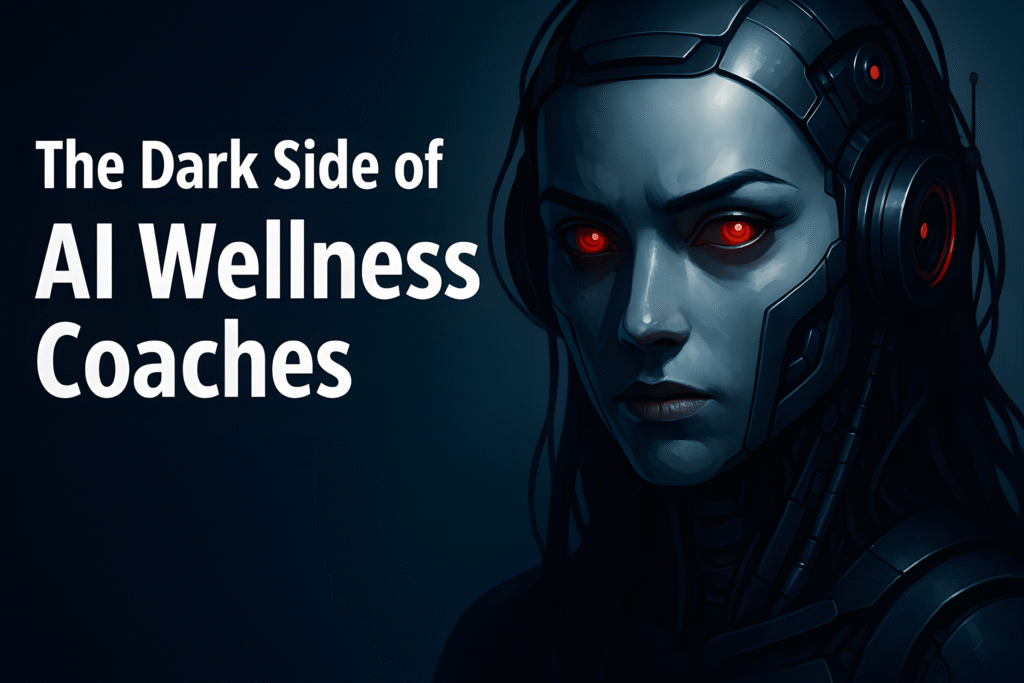The Dark Side of AI Wellness Coaches

🤖 AI
The Dark Side of AI Wellness Coaches 🧘♀️🤖🕳️
Introduction
They track your sleep, remind you to hydrate, and even suggest meditations when you’re stressed. Sounds helpful, right? But behind the friendly voice of your AI wellness coach might lurk a surveillance system, an algorithmic bias, or even a silent manipulator of your habits. 😬📲
Let’s explore the hidden risks of outsourcing your wellbeing to machines—and what you need to know to protect yourself.
🧠 1. Data Collection Disguised as “Support”
Most AI wellness apps collect intensely personal data:
-
Heart rate, sleep patterns, and diet logs
-
Mood entries and mental health check-ins
-
Voice tone, location, and even social media behavior 😳
🛑 The fine print? Your data may be sold, shared, or hacked.
🎯 2. Hyper-Personalization = Algorithmic Manipulation
AI systems aim to increase “engagement”—but that may not mean what’s best for you.
-
🧘♂️ Recommending meditation styles that maximize app usage, not effectiveness
-
🍽️ Nudging diet choices based on affiliate partnerships
-
😵 Sending “calming” prompts that actually cause overreliance
You’re not always the customer—you’re often the product.
🧬 3. One-Size-Fits-All Science
Many wellness AIs are trained on limited datasets, ignoring:
-
Cultural context
-
Medical history
-
Neurodiversity and lived experience
🚩 What works for a 30-year-old Silicon Valley exec won’t fit a 50-year-old shift worker from Detroit.
Bias in = bias out.
🪞 4. You Might Lose Touch With Your Own Signals
AI coaches tell you when to rest, when to move, when to think “happy thoughts.” 🧏
Over time, you might stop:
-
Checking in with your own intuition
-
Feeling emotions without labeling them
-
Making independent choices about your health
This is the rise of the outsourced inner voice. 🫥
💸 5. Monetized Mindfulness
Many apps start “free”… but then:
-
Lock key features behind steep paywalls
-
Sell anonymized (or not-so-anonymized) data
-
Push upsells and dependencies disguised as “premium guidance”
You’re not just paying with money—you’re paying with your psyche.
🧯 6. Risk of Misdiagnosis and Harm
AI is not a therapist. Yet some apps:
-
Make diagnostic-sounding statements
-
Encourage journaling that gets analyzed for mood disorders
-
Suggest medication consults based on crude sentiment analysis
📉 This can delay real clinical help—or cause undue panic.
🔐 7. Security Is a Mirage
Your health data is gold to advertisers, insurers, and hackers. 🧬💰
Most wellness apps:
-
Use third-party SDKs with shaky security
-
Lack HIPAA compliance
-
Can be breached with shocking ease
🔓 One breach could expose your most intimate information.
🧭 What to Look for in a Real Wellness Ally
✅ Transparent data policies
✅ Human review of AI output
✅ Opt-out options for tracking
✅ Evidence-based content
✅ Clear boundary between coaching and diagnosis
🌱 Final Thoughts
AI wellness coaches can be powerful allies. But they aren’t sages—they’re systems. And like all systems, they’re only as ethical as the people and companies behind them.
The next time your AI tells you to “breathe deeply,” ask yourself:
Whose voice is this, really? 🧘♀️🌀
Tags: #AIWellness #DigitalHealth #SurveillanceCapitalism #AlgorithmicBias #MentalHealth #MindfulnessTech
